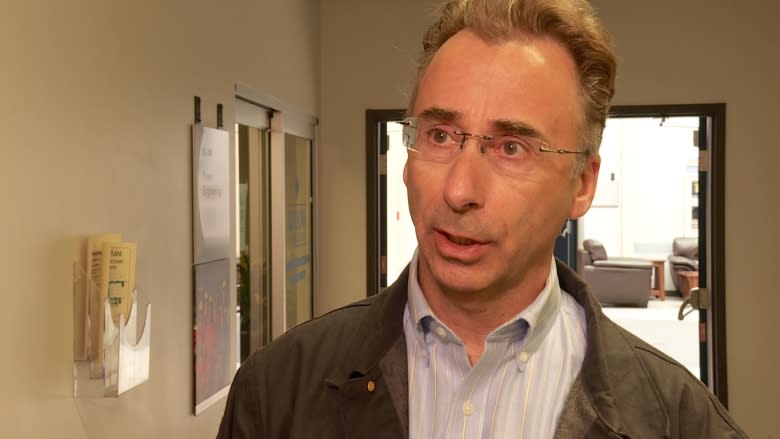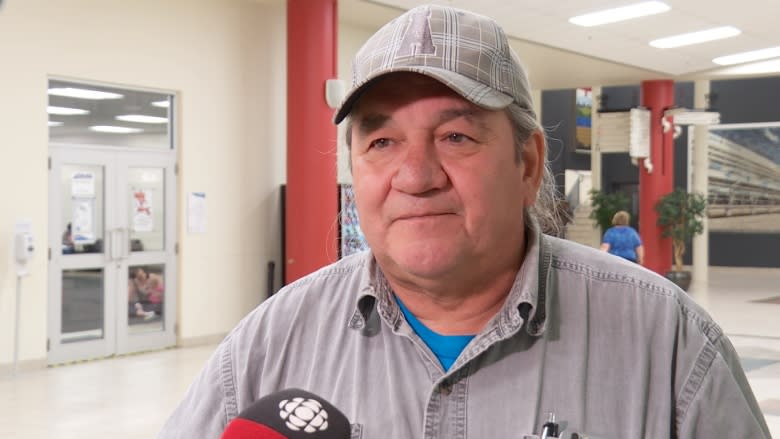Syncrude hits Indigenous employment milestone, but there's more room to grow
Bill Loutitt remembers the days when Indigenous people launched protests because they couldn't get jobs in Fort McMurray's oilsands.
"They were exploiting the resource from our backyard, from our traplines, and we couldn't get work," said Loutitt, now the vice-president of McMurray Métis, the elected council representing Métis people in Fort McMurray and northeastern Alberta.
Times have changed.
On National Aboriginal Day, Syncrude announced it has reached a milestone in Indigenous employment.
The crude oil producer, one of Canada's largest oilsands operators, said 10 per cent of its 4,700 full-time workers self-declare as First Nations, Métis or Inuit.
Among new workers hired in 2016, more than 16 per cent of Syncrude's hires were Indigenous, the company said.
At Suncor, Syncrude's oilsands neighbour, Indigenous employees made up 1.6 per cent of the total workforce of 13,235 in 2015, said Suncor spokesperson Nicole Fisher.
Suncor is Syncrude's majority owner, but its employment numbers don't include Syncrude's workforce. The companies differ in that Syncrude operates mainly n the Fort McMurray area while Suncor has operations across Canada and in the United States.
Syncrude isn't shy about its statistics.
"The math says we are going definitely in the right direction," said Greg Fuhr, Syncrude's vice-president of mining, extraction and production.
Even though significant strides have been made employing Indigenous workers in the oil sands, Syncrude and Indigenous leaders say more work needs to be done to bump those numbers up. Suncor aims to boost Aboriginal representation in its workforce by 50 per cent through 2025 through hiring of new employees and increased self-identification by current employees.
Digging into the numbers
Syncrude has been working on recruiting more First Nation and Métis workers from the region even before it began operations in 1978.
The company uses programs such as fly-in fly-out transportation for workers from the northern community of Fort Chipewyan, which doesn't have an all-weather road. It also invested $435,000 in mobile simulators in Indigenous communities within the Wood Buffalo region.
Loutitt said Syncrude is one of the better oilsands operators in the region. However, he questions how many of those increased Indigenous hires occupy management or high-skilled positions, and if they're even from the region.
"When they're saying, 'Aboriginal,' " he says, "does that mean local Aboriginal or from all across Canada?"
Fuhr said of Syncrude's 475 Indigenous workers, 140 are in supervisory and management roles.
However, Syncrude spokesperson Will Gibson said the company can't provide a breakdown of how many Indigenous workers are from the region. But he said the company aims to hire local.
Matching skills with jobs
Brad Callihoo of Fort McMurray No. 468 First Nation also commended Syncrude for employing many of its members and contracting their businesses.
However, some members of the First Nation have found it hard to get jobs they have trained for.
Callihoo said the First Nation trained 12 heavy equipment operators and they haven't been able to find jobs in that field.
"Training is great but let's have some outcomes," Callihoo said. "I think there's a better job to be done."
'Look at the jobs of the future'
If Syncrude wants continued success growing its Indigenous workforce, it needs to partner with Indigenous communities and their young people, said Kelly Lendsay, president of Indigenous Works, which is trying to expand the roles of First Nations, Inuit and Métis people in the Canadian economy.
Lendsay, whose ancestry is Cree, Métis and European, said Syncrude and Indigenous communities need to be ready to fill high-skilled jobs in software engineering, artificial intelligence and robotics.
"We need to look at the jobs of the future," Lendsay said. "We know that 40 per cent of the jobs 10 to 15 years from now aren't even invented."
Driverless trucks are already being tested in the oilsands, sparking fears those traditional mining jobs might drive away as well.
Fuhr said Syncrude is aware of these changes and it's preparing its present and future workforce for those future in monitoring and operating equipment remotely.
Follow David Thurton, CBC's Fort McMurray correspondent, on Facebook, Twitter or contact him via email.



